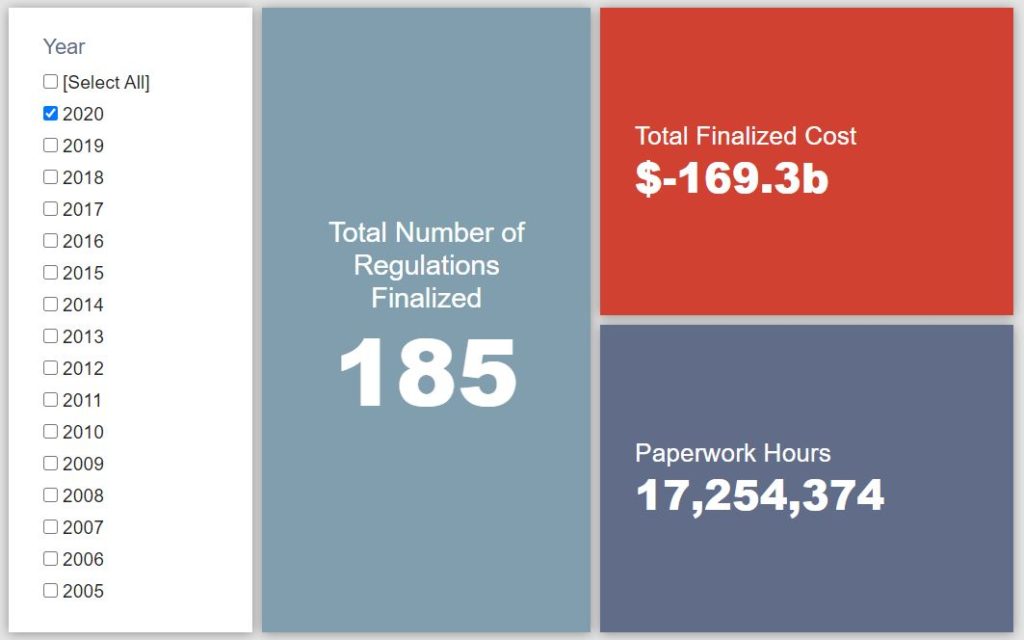Week in Regulation
July 13, 2020
A “Deregulatory” Proposal Leads Week in New Costs
In an otherwise-quiet week, one ostensibly deregulatory proposed rulemaking from the Department of Labor (DOL) actually provided the bulk of new costs. The proposal seeks to provide an exemption to certain restrictions under the Employee Retirement Income Security Act of 1974 (ERISA), thereby opening up further retirement savings plan options but also bringing measurable compliance costs. Across all rulemakings, agencies published $509.6 million in total net costs and added 298,227 hours of annual paperwork.
REGULATORY TOPLINES
- Proposed Rules: 43
- Final Rules: 93
- 2020 Total Pages: 41,847
- 2020 Final Rule Costs: -$169.3 billion
- 2020 Proposed Rule Costs: $7.5 billion
TRACKING THE REGULATORY BUDGET
The DOL proposal regarding ERISA provided the vast majority of quantifiable costs to the week. The rulemaking “would allow investment advice fiduciaries under both ERISA and the Code to receive compensation, including as a result of advice to roll over assets from a Plan to an IRA, and to engage in principal transactions, that would otherwise violate the prohibited transaction provisions of ERISA and the Code.” While this is deregulatory in rolling back previous restrictions, DOL does estimate that it will bring $30 million in annualized administrative costs (or nearly $430 million in present value) for the purposed of Executive Order 13,771. Since it is still a proposed rule, however, these costs do not yet apply to the fiscal year (FY) 2020 regulatory budget.
The Trump Administration expected to reach $51.6 billion in cumulative net savings in FY 2020. To date in the fiscal year, agencies have officially published 106 deregulatory actions and 35 regulatory actions, totaling $171.3 billion in quantified total net cost savings.
THIS WEEK’S REGULATORY PICTURE
This week, the Department of Homeland Security and the Department of Justice (the Departments) cite COVID-19 as a reason to further restrict grants of asylum or withholding removal of certain immigrants.

Source: https://www.federalregister.gov/documents/2020/12/23/2020-28436/security-bars-and-processing
In the July 9 edition of the Federal Register the Departments published a proposed rule on “Security Bars and Processing.” The proposed rule would amend existing regulations to clarify that the Departments may consider public health emergency concerns based on the spread of pandemics when “making a determination as to whether ‘there are reasonable grounds for regarding [an] alien as a danger to the security of the United States’ and, thus, ineligible to be granted asylum or the protection of withholding of removal in the United States.”
The proposed rule would make four regulatory changes the Departments deem “fundamental and necessary reforms to the Nation’s immigration system.” Those changes specify that:
- International pandemics can be grounds to find that someone poses a “danger to the security of the United States;”
- A public health emergency can be used in “credible fear” screenings – where the federal government determines the veracity of an asylum claim – to expedite removal;
- A public health emergency can similarly be used to decline an immigrant’s appeal to withhold removal from the United States, and;
- Allows for the removal of those who are ineligible for asylum, but who have demonstrated that they face the risk of torture if returned home, or to send them to a third country.
The proposed rule heavily cites COVID-19 to demonstrate the risks to national security posed by public health emergencies. Whereas other notable COVID-19-related foreign entry restrictions have applied only to the duration of the current emergency, this proposal would permanently change the Departments’ regulations to apply to future international public health emergencies.
TOTAL BURDENS
Since January 1, the federal government has published $161.8 billion in total net cost savings (with $169.3 billion from finalized rules) and 35 million hours of net annual paperwork burden increases (with 17.3 million hours due to final rules). Click here for the latest Reg Rodeo findings.












